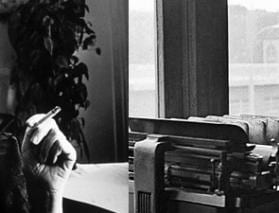The prospect of living with – as distinct from near or among – the poor is perhaps the most daunting aspect of the Dorothy Option, especially for a middle-class suburbanite whose “home is his castle.” It’s one thing to bring food and toiletries to a homeless person. It is something else altogether to negotiate cooking chores and bathroom time with that same person in a shared home.
Dorothy understood that embracing radical hospitality had to be accomplished in small steps. In a December 1936 Catholic Worker column, Day begins by noting that workers in a number of places were either planning or already had opened Houses of Hospitality. She uses these developments as an opportunity “to reiterate some of the principles by which we began our work.” She goes on to write,
“We emphasize again the necessity of smallness. The idea, of course, would be that each Christian, conscious of his duty in the lay apostolate, should take in one of the homeless as an honored guest, remembering Christ’s words, ‘Inasmuch as ye have done it unto the least of these, ye have done it unto me.’
“The poor are more conscious of this obligation than those who are comfortably off. We know of any number of cases where families already overburdened and crowded, have taken in orphaned children, homeless aged, poor who were not members of their families but who were akin to them because they were fellow sufferers in this disordered world.
“So first of all let us say that those of our readers who are interested in Houses of Hospitality might first of all try to take someone into their homes.”
By such small, simple steps are revolutions begun. They create tiny state changes in the social and spiritual environment that with time and grace can produce what the mathematician Edward Lorenz described as the Butterfly Effect. But the big picture isn’t really our concern. That’s the way of ideology: love for humanity, neglect of persons. No, we should always tend first to the concrete brother or sister before us. If I hate homelessness as a social evil but fail to shelter the person beside me, what good is my social concern? As Dorothy wrote at the end of her December 1936 column, “We have a big program but we warn our fellow workers to keep in mind small beginnings. The smaller the group, the more work is done. And let us remember, ‘Unless the Lord build the House, they labor in vain that build it.'”











